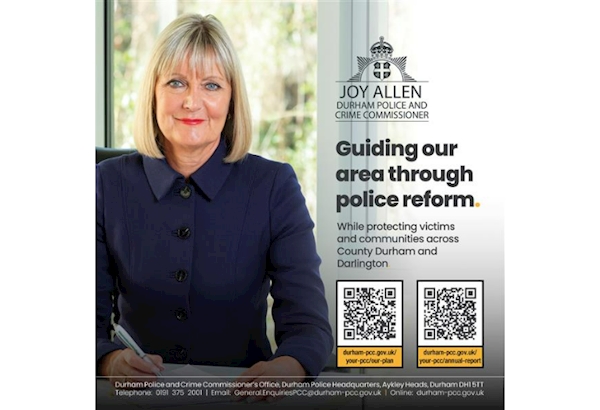
|
||
|
|
||
|
||
|
A message from the Police and Crime Commissioner, Joy Allen... Abolishing PCCs Puts County Durham at Risk – And Local People Deserve Better |
||
|
The Government’s announcement that Police and Crime Commissioners are to be abolished has caused confusion and real concern. People naturally want to know: What does this mean for our area? Who will stand up for us? Who will hold the police to account? For County Durham and Darlington, the risks are more serious than almost anywhere else in the country. Our policing area sits across two different combined authorities and is fully covered by neither. When PCCs disappear, there is no obvious elected person ready to take on the job of scrutinising the Chief Constable, protecting victims’ services or championing local policing priorities. This matters because PCCs were created to give communities a strong, visible, directly elected voice in policing. Before PCCs, decisions were taken behind closed doors by distant committees most residents had never heard of. Victims had little influence. The public had none. And unlike any of those old models, the PCC role comes with a powerful, county-wide democratic mandate. In May 2021 67,652 people across County Durham and Darlington voted for me — the largest personal vote of any elected politician in our entire area. More than any MP, more than the North East Mayor received within the Durham local authority area. And vastly more than local leaders elected in small wards with just over 1000 votes. To replace a county-wide mandate of nearly 70,000 votes with someone chosen by a tiny minority of a certain area of County Durham or Darlington is not reform — it is a democratic downgrade. And contrary to the narrative in Westminster, the public do understand what PCCs do. Our latest survey shows: • 63% know PCCs fund crime prevention and harm-reduction services. • 60% know PCCs set the policing budget and council tax precept. • 64% know the PCC’s core job is to hold the Chief Constable to account. Local people know who represents them — and they know who to contact when things go wrong. What makes this decision even harder to justify is the way it has been made: with no consultation at all. Not with PCCs not with Police colleagues, not with victims’ groups, not with councils, not with local communities. Instead, it has been designed inside the Westminster bubble, by civil servants and advisers hundreds of miles away who do not understand our geography, our rural communities or our needs. Meanwhile, the national police funding model continues to disadvantage forces like ours. Instead of fixing that, the Home Office is driving policing towards greater centralisation, bigger and more remote structures, and even the possibility of future force mergers. It feels less like reform and more like a Whitehall dictate — “back to the future” policymaking that ignores years of evidence and even Parliament’s own recommendations that PCCs should be given more powers, including over criminal justice services, not abolished. But the biggest danger is this: because our area is split across two combined authorities, every other force in the North East will have a clearer replacement model than us. Unless this is addressed, County Durham and Darlington could be left with weaker accountability, diluted victims’ services and no direct democratic voice at all. Let me reassure you: for the next few years, I remain your PCC. I will continue fighting for visible policing, safer roads, strong victims’ services and a fair funding deal for our force. I will not allow our communities to lose the local voice they deserve. You deserve accountability rooted in County Durham — not decisions handed down from London. And I will keep speaking up loudly and clearly for you.
| ||
Reply to this message | ||
|
|





